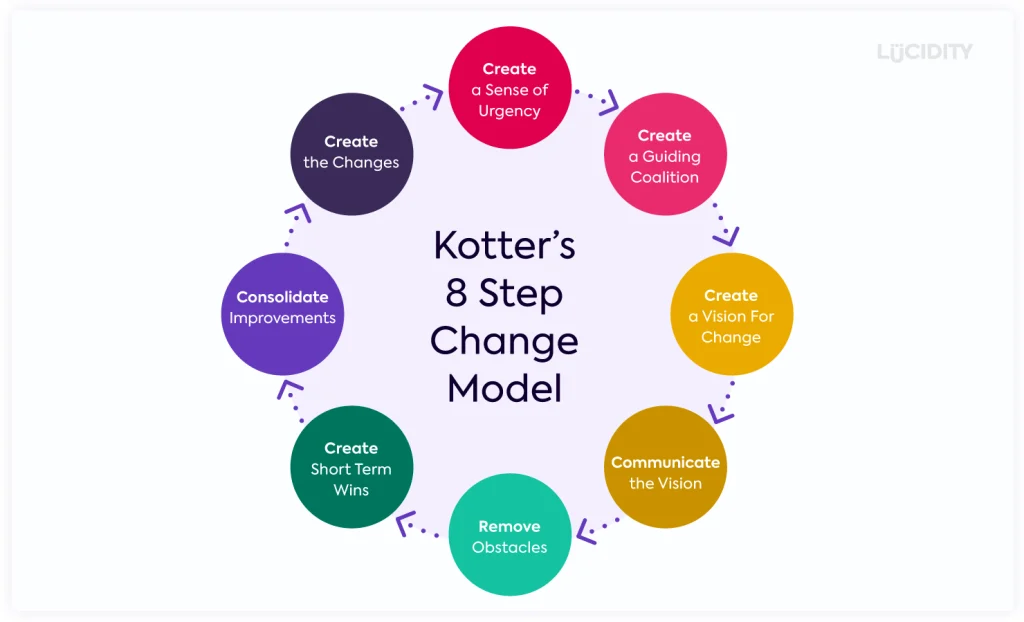In today’s rapidly evolving business landscape, the ability to adapt to change is essential for organizations to thrive. Whether it’s technological advancements, market shifts, or internal restructuring, change is inevitable. However, managing change effectively is often easier said than done. Without a structured approach, organizations risk encountering resistance, inefficiencies, and even failure in their transformation efforts. This is where Change Management Frameworks come into play, offering a systematic approach to navigate through transitions smoothly and achieve desired outcomes. In this article, we delve into the significance of Change Management Frameworks and how they streamline transformation processes for organizations.
Understanding Change Management Frameworks
Change Management Frameworks provide a structured approach to managing the people side of change within an organization. These frameworks offer a set of principles, methodologies, and tools to guide organizations through the process of initiating, planning, executing, and sustaining change initiatives. They help in addressing various aspects of change, including communication, stakeholder engagement, training, and resistance management.
Importance of Streamlining Transformation Processes
In today’s dynamic business environment, organizations must streamline their transformation processes to remain competitive and agile. A streamlined approach ensures that change initiatives are executed efficiently, minimizing disruption to operations and maximizing the likelihood of success. By adopting a standardized Change Management Framework, organizations can achieve consistency, scalability, and effectiveness in managing change across different projects and departments.
Key Components of Change Management Frameworks
- Assessment and Planning: The first step in any change initiative is to assess the current state of the organization and identify the need for change. This involves conducting stakeholder analysis, assessing risks and opportunities, and defining clear objectives and goals for the transformation. A robust Change Management Framework provides guidance on how to conduct these assessments and develop a comprehensive change management plan.
- Communication and Engagement: Effective communication is critical for gaining buy-in and support from stakeholders at all levels of the organization. Change Management Frameworks emphasize the importance of clear, transparent communication throughout the change process. This includes informing employees about the rationale behind the change, addressing their concerns and feedback, and keeping them updated on the progress and impact of the transformation.
- Training and Development: People are at the heart of any change initiative, and equipping them with the necessary skills and knowledge is essential for successful implementation. Change Management Frameworks include strategies for identifying training needs, designing relevant training programs, and providing ongoing support to employees as they transition to new ways of working.
- Resistance Management: Resistance to change is natural, but it can derail even the most well-planned initiatives if not addressed effectively. Change Management Frameworks offer strategies for identifying and addressing sources of resistance within the organization. This may involve engaging with key stakeholders, addressing misconceptions and fears, and providing support and incentives for embracing change.
- Monitoring and Evaluation: Change is a continuous process, and organizations must regularly monitor and evaluate the effectiveness of their change initiatives. Change Management Frameworks provide tools and techniques for tracking progress, measuring outcomes, and identifying areas for improvement. This allows organizations to make necessary adjustments along the way and ensure that the change efforts are delivering the desired results.
Enterprise Change Management Solutions
In today’s complex business environment, organizations often require more than just a one-size-fits-all approach to change management. Enterprise Change Management Solutions offer customizable frameworks and tools tailored to the unique needs and challenges of large organizations. These solutions provide scalability, flexibility, and integration capabilities to effectively manage change across multiple projects, departments, and geographical locations. To navigate the complexities of organizational transformation with precision and strategic foresight, delving into enterprise change management solutions unveils a path towards achieving operational excellence and sustaining competitive advantage in the dynamic business landscape.
Enterprise Change Management Solutions enable organizations to centralize change management processes, standardize methodologies, and leverage technology to streamline transformation efforts. By providing a centralized platform for collaboration, communication, and knowledge sharing, these solutions facilitate alignment and coordination among various stakeholders involved in the change process.
Furthermore, Enterprise Change Management Solutions offer robust analytics and reporting capabilities, allowing organizations to track the impact of change initiatives, identify areas of improvement, and make data-driven decisions to optimize their change management strategies.
Conclusion
Change is a constant in today’s business world, and organizations must adapt and evolve to stay ahead. Change Management Frameworks provide a structured approach to managing transformation processes effectively, ensuring that organizations can navigate through change with minimal disruption and maximum success. By adopting Enterprise Change Management Solutions, organizations can streamline their change management processes, achieve greater agility and resilience, and drive sustainable growth in an ever-changing environment.
